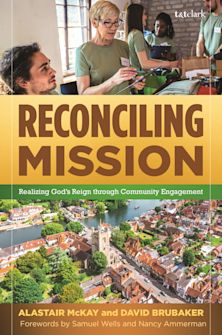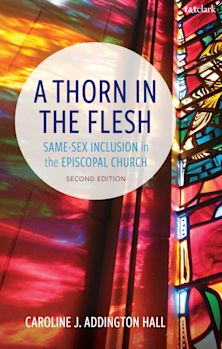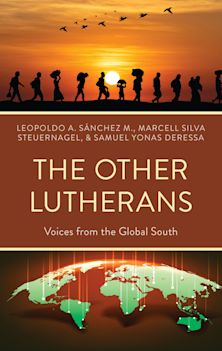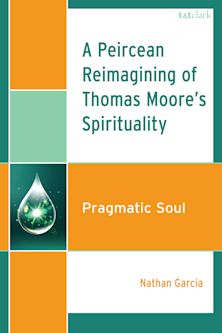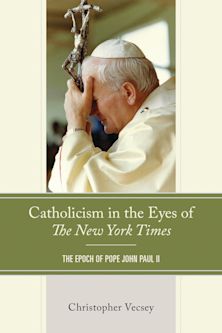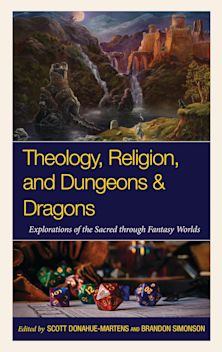- Home
- ACADEMIC
- Theology
- Theology - Other
- A Postfoundationalist Comparative Christology
A Postfoundationalist Comparative Christology
Parity, Particularity, and Universality in Indian Interreligious Dialogues
A Postfoundationalist Comparative Christology
Parity, Particularity, and Universality in Indian Interreligious Dialogues
You must sign in to add this item to your wishlist. Please sign in or create an account
Description
Interreligious relationships are often hindered by epistemic disparity caused by the nexus between religions and state powers. To solve this problem, David Muthukumar Sivasubramanian develops a postfoundationalist epistemological framework to affirm the epistemic parity and plurality of religions while upholding their particularity and universality. Building on this postfoundationalist epistemology, a comparative Christology paradigm that uses insights from the extant comparative theology method is reformulated with a Christological focus. This model seeks to affirm the exclusive faith assertions of Christianity and the corresponding universal claims for Christ. It also sustains the particular religious identity of a comparative theologian over against any compulsion to assume hybrid identity in the interreligious cross-learning. This comparative Christology framework is exhibited through cross-learning with the Tamil Saiva Siddhanta tradition. This method is shown to affirm not only the particularity and universality of Christianity but also of the Tamil Saiva Siddhanta tradition by defining each religion’s attempt at their revealed truth as a parallel quest for truth. Thus, it facilitates dialogue across religions by securing one’s self-identity and the other’s alterity.
Table of Contents
2 A Comparative Christology Method
3 The Tamil Saiva Siddhanta Faith
4 A Constructive Comparative Christology
Product details
| Published | Mar 28 2022 |
|---|---|
| Format | Ebook (PDF) |
| Edition | 1st |
| Extent | 214 |
| ISBN | 9781978785038 |
| Imprint | Fortress Academic |
| Publisher | Bloomsbury Publishing |
About the contributors
Reviews
-
This book by Dr. David Muthukumar S. takes Christian-Hindu engagement to the next level. The study has an ambitious two-fold goal. First, it seeks to develop a proper methodology for comparative theological study for the third millennium, in a critical and sympathetic dialogue with earlier approaches. Second, it applies successfully this methodological template to some pertinent theological issues between Christian faith and Tamil Saiva Siddhantham. Not only that, alongside theological issues, this study also delves deeply into the complicated network of power and its influence on interfaith relations, not least with regard to marginalization. Highly recommended for academicians, pastors, and interested lay persons.
Veli-Matti Kärkkäinen, Professor of Systematic Theology, Fuller Theological Seminary and Docent of Ecumenics, University of Helsinki, Faculty of Theology
-
Dr. David Muthukumar presents an imaginative and carefully constructed approach to Christian interreligious relations. Mindful of the strengths and weaknesses of the main models of recent years, he skillfully balances one against another to develop his own unique approach as he engages with the Tamil Saiva Siddhantham philosophical tradition. A tour de force!
Kirsteen Kim, Fuller Theological Seminary
-
Boldly and adeptly furthering the postfoundational quest to affirm epistemic parity between science, philosophy, and religion, and building on the work of gurus in the field of comparative theology like Thomas Thangaraj and Francis Clooney, the author of this significant and substantial work resourcefully and creatively offers the outcomes of what it means to traverse deep into the Tamil Saiva Siddhanta tradition, without arrogant assumptions or superficial comparisons, but rather with the resolve to be unsettled and refined by this quest and return to one’s own tradition empowered and enriched in furthering our commitment to interfaith dialogue and praxis.
Rev. J. Jayakiran Sebastian, United Lutheran Seminary
-
A Postfoundationalist Comparative Christology is a significant contribution that embarks on constructing a model for inter-religious engagement in a pluralistic context. The unique postfoundationalist epistemology that it propounds at once affirms the fact of plurality (often compromised by the inter-religious dialogue model) and one’s identity essential in a Christian witness (often compromised by comparative theology model). Endowed with unique proximity and in-depth knowledge of Saiva Siddhanta and Christian theology, the author combines meticulous theory, methodological thoroughness, and an eye on praxis. This work ushers in new frontiers in the field of interreligious engagement.
Varughese John, South Asia Institute of Advanced Christian Studies (SAIACS)
-
This book is a welcome addition in the field of comparative theology as it invites Christian theologians to dialogue with Tamil Saiva Siddhanta tradition. Set in the context of religious majoritarianism in India and the ensuing conflicts in the name of religions that poses significant challenges for religious minorities—sections of Indian Christians being closed to other faiths, and the struggles of a theologian in preserving one’s Indian-Christian identity while engaging other religions from the milieu of Christian particularity—this book joins the ongoing efforts for bridging religions and building relations between adherents of different faiths.
Muthuraj Swamy, Cambridge Centre for Christianity Worldwide
-
Every theologian and religionist concerned with becoming compassionately interreligious while being passionately Christian needs to read this book. Honoring his Hindu roots while celebrating his embrace of Christianity, Muthukumar imaginatively mines multiple disciplines to dexterously construct a postfoundational interreligious approach for incorporating the particularity and universality of religions by means of a spacious Christology. Weaving together the personal and political, religion and science, and Hindu philosophy and Christian theology, the author opens a pathway that harmonizes the confessional with the comparative for interreligious truth to enrich everyday life.
Sathianathan Clarke, Wesley Theological Seminary

ONLINE RESOURCES
Bloomsbury Collections
This book is available on Bloomsbury Collections where your library has access.












